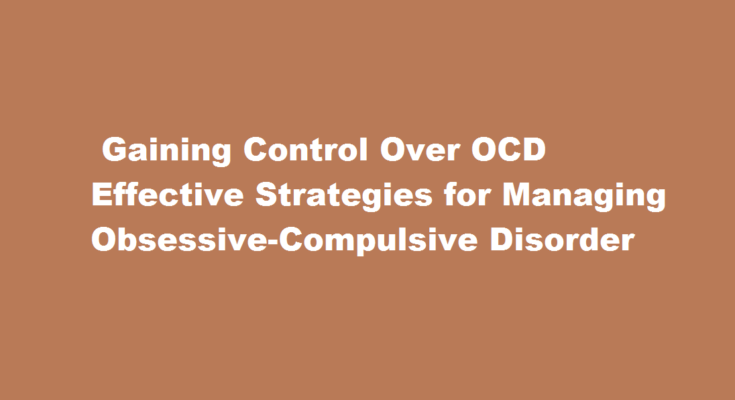Introduction
Obsessive-Compulsive Disorder (OCD) is a mental health condition that affects millions of people worldwide. OCD is characterized by persistent and intrusive thoughts, known as obsessions, followed by repetitive behaviors, known as compulsions. While OCD can be challenging to manage, there are effective strategies that individuals can utilize to gain control over their symptoms and lead fulfilling lives. In this article, we will explore various techniques and approaches that can help individuals with OCD manage their condition more effectively.
Understanding OCD
To gain control over OCD, it is crucial to understand the nature of the disorder. OCD is rooted in anxiety and manifests in obsessions and compulsions. Obsessions are intrusive thoughts or images that cause distress, while compulsions are repetitive behaviors or mental acts aimed at reducing anxiety. Recognizing that these thoughts and behaviors are a result of the disorder, rather than reflecting personal values or character, is an essential first step in gaining control.
Seek Professional Help
Consulting with a mental health professional, such as a psychiatrist or psychologist, is crucial for obtaining an accurate diagnosis and developing an effective treatment plan. Cognitive-Behavioral Therapy (CBT) and medication are common approaches for managing OCD. CBT helps individuals identify and challenge their obsessive thoughts and teaches them healthier ways to respond to anxiety. Medication, such as selective serotonin reuptake inhibitors (SSRIs), can be prescribed to help manage the symptoms of OCD. Working with a professional provides guidance and support throughout the recovery process.
Build a Support System
Creating a strong support system is vital for individuals with OCD. Loved ones, friends, or support groups can provide understanding, encouragement, and a safe space to share experiences. Interacting with individuals who have experienced similar challenges can help reduce feelings of isolation and provide practical advice on coping strategies. Remember, you are not alone in your journey, and seeking support from others who understand your struggles can make a significant difference in gaining control over OCD.
Establish Healthy Coping Mechanisms
Developing healthy coping mechanisms is essential for managing OCD. Engaging in regular physical exercise, practicing relaxation techniques (such as deep breathing or meditation), and maintaining a balanced diet can contribute to overall well-being and reduce anxiety levels. Engaging in hobbies, creative outlets, or activities that bring joy and relaxation can also help distract from obsessive thoughts and compulsive behaviors. Experiment with various strategies to find what works best for you and incorporate them into your daily routine.
Challenge Negative Thoughts
OCD often involves distorted thinking patterns, which can fuel obsessions and compulsions. Learn to challenge and reframe these negative thoughts by examining evidence that contradicts them. Keeping a thought journal can help identify patterns and provide an opportunity to challenge and restructure irrational beliefs. Practicing mindfulness techniques can also help individuals detach from their thoughts and observe them without judgment, reducing their impact on daily life.
Gradual Exposure and Response Prevention
Exposure and Response Prevention (ERP) is a fundamental component of CBT for OCD. ERP involves gradually exposing oneself to situations or triggers that provoke obsessions, without engaging in the associated compulsions. By exposing yourself to these situations and preventing the usual response, anxiety gradually diminishes, and you develop a sense of control. ERP should be done under the guidance of a mental health professional, as they can provide support and ensure the process is tailored to your specific needs.
Frequently Asked Questions
How do you truly overcome OCD?
The type of behavioral therapy shown to be most effective for OCD is known as Exposure and Response Prevention (ERP or ERP). E&RP consists of gradually confronting your fearful thoughts and situations while resisting the performing of compulsions.
IS OCD INHERITED?
Research shows that OCD does run in families and that genes likely play a role in the development of the disorder. Genes appear to be only partly responsible for causing the disorder though and it is thought that it is more likely a combination of genetic susceptibility and environmental influences.
Conclusion
Gaining control over OCD is a challenging but achievable goal. By understanding the nature of OCD, seeking professional help, building a support system, and adopting healthy coping mechanisms, individuals can effectively manage their symptoms and regain control of their lives. Remember, you are not defined by your OCD, and with the right strategies and support, you can lead a fulfilling life.
Read Also : Understanding and Treating OCD A Comprehensive Guide



